Reinventing Our Communities
How inclusive small business recovery can bolster local economies
Excitement was palpable. One-by-one more than 100 professionals from communities across the US joined the video call to introduce themselves. Over the next 10 months they would examine barriers faced by business owners of color. They’d brainstorm solutions and collaborate on actionable plans—all to support an inclusive and resilient Main Street economic recovery.
By Mary Godleski-Cantin

Supporting small business owners and entrepreneurs
“We know that small businesses are vital for vibrant local economies. They are prime drivers of US job growth,” said Theresa Singleton, senior vice president and community affairs officer at the Philadelphia Fed. Singleton oversees the Bank’s research and engagement programs to increase access to economic opportunity for low- and moderate-income communities. “It has become increasingly clear that some segments of the population experience barriers to participation in the economy. That’s important for us to address. It’s part of the Fed’s mandate from Congress to support full participation to ensure a healthy labor market and strong overall economy.”
Closing gaps in small business recovery to benefit all
Small business owners and entrepreneurs, particularly those of color, were among the hardest hit by the COVID-19 pandemic. Many were unable to take advantage of programs designed to assist them such as the Paycheck Protection Program. One challenge was in accessing support from their financial institutions. Another was disconnection or exclusion from formal information networks.
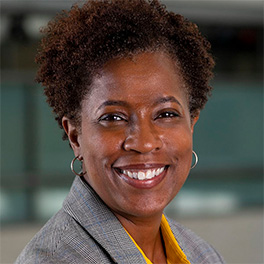
In fact, according to the U.S. Chamber of Commerce, Black-owned businesses closed at more than twice the rate of white-owned businesses since March 2020. Additionally, they experienced steeper cash declines. Latino- and Asian-owned businesses experienced the same trends. Similarly, the Fed’s Small Business Credit Survey found that 67% of both Asian- and Black-owned firms and 63% of Hispanic-owned firms had to reduce their operations. In comparison, 54% of white-owned firms reduced operations.
Firms forced to reduce operations due to the COVID-19 pandemic
67%
Asian-owned firms
67%
Black-owned firms
63%
Hispanic-owned firms
54%
white-owned firms
Source: Federal Reserve Small Business Credit Survey: 2021 Report on Firms Owned by People of Color
A U.S. Chamber report estimates that barriers to assistance programs, coupled with accelerated financial distress, contributed to more than 40% of Black-owned US businesses closing from February to April 2020.
Developing unique local small business recovery plans
One avenue to help small businesses emerged through the Federal Reserve Reinventing Our Communities (ROC) program. In 2021, it focused on an equitable small business recovery.
Nine community cohorts attended their first ROC meeting in September 2021. Over the next few months, they attended bi-weekly trainings and intensive workshops. Each session was designed to help community stakeholders center racial equity while examining obstacles to small business recovery and growth in their downtowns.
Participants brought a variety of perspectives, unique experiences, and historic knowledge to conversations. They represented diverse industries, populations, and resident demographics. While some came from local government and chambers of commerce, others worked at nonprofits and community foundations. Entrepreneurs, small business owners, and others rounded out the cohorts.
In March 2022, as their program drew to a close, each cohort presented action plans to guide their work moving forward. Overall, cohorts found they had similar needs despite local and regional differences.
- Collecting data
- Connecting resources for small businesses
- Identifying ways to advance racial equity education within financial institutions and local government, and with others in the community
- Continued conversation and action
We recently caught up with several cohort members to share their takeaways.
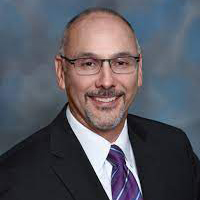
“It doesn’t matter what zip code you live in, what size business you are. We’re all focused on powering prosperity for everyone so everyone has an equal opportunity for health, wealth, education, and success.”
Joseph Hovancak, cohort lead and executive director of the Greater Fort Lauderdale Alliance’s Prosperity Partnership

Shining a light on small business needs in Broward County, FL
Broward County includes 31 municipalities in the Greater Fort Lauderdale area. It boasts one of the largest and most diverse labor forces in Florida.
- More than 63% of Broward County’s 2 million residents are Black, Indigenous, and People of Color (BIPOC).
- More than 100 dialects are spoken.
- Small businesses with fewer than 500 employees make up 95% of its business sector.
“We really wanted to be a part of something that would give greater momentum, and shine a light on, the racial equity work that needs to be done, particularly in the small business sector,” said Courtnee Biscardi. Biscardi is executive vice president at Urban League of Broward County and a member of the Broward County ROC cohort.
For all of the 2021 ROC cohorts, the need for data quickly emerged as a priority. They knew it could be a driver of real change, informing where they should focus their efforts. “We landed on a scorecard because to know where we’re going, or where we want to go, we have to have a baseline for where we are right now,” Biscardi said.
One opportunity they sought to understand better was procurement. Universities and hospitals are major employers in the county, as well as potential business partners. A missing but important data point was the number of minority-owned small businesses currently contracted by local anchor institutions for goods or services. The cohort also wanted to identify how many business owners have participated in the procurement process.
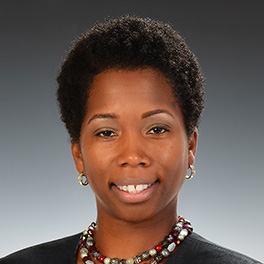
Making sure small business owners have a say in their own future
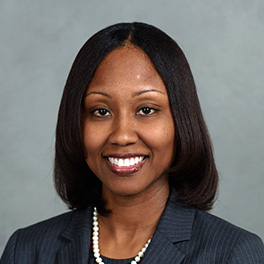
Shaheewa Jarrett Gelin is founder and executive director of the Broward County Black Chamber of Commerce and another member of the Broward County ROC Cohort. She was on the front lines of helping small businesses weather the pandemic’s impacts. She’d take calls and visit many Black-owned businesses in the area. As a former immigration lawyer and small business owner herself, Gelin knew all too well the challenges of starting and sustaining a small business. She also knew, firsthand, the heartache and losses caused by the pandemic.
“I’m very grassroots,” said Gelin. “I knocked on the doors of businesses who weren’t even my members to better understand what they were going through.” Many owners shared very real fears of losing their businesses and livelihoods. Depleting savings to keep staff on the payroll was common. Gelin feels it’s only fair for them to have a platform and voice in creating solutions meant to help them.
“I went on a six-city tour talking to small business owners before I launched this Chamber. I envisioned us doing something like that here; really hearing from people who, every day, are fighting to keep their businesses open,” shared Gelin.
Gelin agrees with Biscardi that access to data is important for the cohorts as well as local organizations and institutions. It helps them better understand how their own systems and processes can be more inclusive. The former litigator also wants to know where the status quo isn’t working for people.
“As we all know in business, if you truly care about something, you track it,” Gelin explained. “From there we can start to inform how policies and practices of local institutions, especially our anchor institutions, work to support Black small business growth.”

Dealing a better hand to business owners of color in Las Vegas, NV
Las Vegas is known for expansive gaming halls and hotels, fine dining, and nightlife. But small businesses are also a vital part of the city’s economy, especially off the Strip.
Districts such as downtown Las Vegas, the Fremont East Entertainment District, and Symphony Park are primarily composed of small businesses. You’ll find an eclectic mix of art, food, and retail shops owned by the city’s residents.
Millions of visitors come to Las Vegas every year. In comparison, however, the full-time population is “actually quite small, just 635,000 residents,” said Nalani Aki. Aki is administrator of Neighborhood Revitalization and Community Engagement in the city.
More than a third of Las Vegas residents are Hispanic or Latino, and 12% are Black or African American. Yet, within the local business environment, entrepreneurs of color have continually faced challenges. Accessing capital, getting approved for loans, and securing prime locations for their businesses top the list. These obstacles are due to historical and systemic barriers; barriers that Aki says are at the core of change.
“When we talk about entrepreneurship and driving change in our community, we must examine the policies and nuances that have allowed systemic discrimination to continue,” she explained.

Getting the right data and supporters
In Charleston, South Carolina, the ROC cohort established a new Greater Charleston Minority Business Council. It will focus on building a more inclusive business ecosystem. Similar to Broward County, they plan to use demographic data that the city collects during the business registration process to assemble a “Black-owned business scorecard.” The scorecard will track the number of Black-owned businesses started and funded, as well as how much funding has been made available to support these businesses.
Meanwhile, the Allentown, Pennsylvania cohort plans to stand up a centralized data collection system. It will track demographic information of current business owners.
Other cohorts recognized the need for both data and dedicated support to carry out their action plans. In Lancaster, Pennsylvania, a community liaison will help connect BIPOC entrepreneurs with available resources and marketing opportunities. The liaison will also support education for lenders and service providers to strengthen their cultural competencies and inclusive practices.
“We found that there was a lot going on in the community. The gap was in connection,” said Alma Felix.
Felix is the Lancaster cohort lead and a program officer at the Lancaster County Community Foundation, which is working with community stakeholders to hire the liaison. “Having someone dedicated to advocating for BIPOC owners and making these connections with and among providers is one of our main goals.”

Catalyzing connections in York, PA
In York, Pennsylvania, ROC conversations became a catalyst for connection, providing opportunities for education and networking. Local business owners described the meetings as “judgement-free zones.” In these spaces, they could speak openly about difficulties and find support among those facing similar struggles.
“One of our key takeaways was the value these sessions brought to small business owners,” shared Sully Pinos, lead for the York County cohort. As a result, Pinos, who also serves as the executive director of York’s Bloom Business Empowerment Center, plans to include more ongoing educational programming, marketing, and networking opportunities for local small businesses owners at the Bloom Center.
“The ROC Cohort program came at a perfect time,” Pinos noted, pointing to York County’s recently updated economic development plan and strategies for addressing a gap in the county’s business birthrate, particularly for new businesses owned by women and minorities. “Through ROC, we forged new partnerships and built trust within our business community—and both are essential for an economic development plan that serves everyone.”
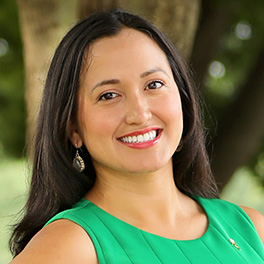
Remarkably, during the 2021 program, the York cohort built partnerships in almost all the county’s 72 municipalities. It allowed them to expand the reach of a series of small business development classes the Bloom Empowerment Center launched last July. More than half of the 175 participants were local business owners of color. Of note, 43% were entrepreneurs looking to launch a business within the next year or two. Additionally, the Bloom Empowerment Center was instrumental in directing more than $30 million in COVID-19 relief funding to 1,900 small businesses and nonprofits throughout the county.
Further addressing access to capital in changing communities
Tim Warfield has lived in York County for over 50 years. Now retired, he joined the York County cohort to offer his training and grantmaking expertise. Previously, he led the National Association for State Community Services Programs and chaired the Pennsylvania Community Development and Finance Corporation. Both organizations specialize in providing loans and grants to communities.
Warfield recognizes the York community has changed, and with it, the needs of small business owners. “We’ve been watching the demographics change for many years. Our Latino and Asian resident populations have grown significantly,” he said. “But business growth in minority communities is lacking, and we need to examine why.”
Warfield acknowledges that conversations around better ways to support small businesses are not new. Getting the right people around the table focused on shared solutions is critical, though. It’s something Warfield appreciated about the ROC Cohort Program.
For businesses, Warfield stresses that funding is available. He encourages owners to explore all opportunities. Options can include loans with entities like the Small Business Administration and grants with community-focused groups such as foundations and nonprofits. He would like to expand the ways small businesses can access capital and grow. “The question we need to ask,” he notes, “is whether the funding makes sense in the context of what needs to happen for inclusive and sustained growth.”
What’s next for Reinventing Our Communities (ROC)
Launched in 2020, ROC works with groups of community stakeholders to increase access to economic opportunity and encourage full participation in the local economy—key goals of the Fed’s mandate of full employment.
The 2022 ROC Cohort program is underway with 11 new cohorts from 10 states. Their focus is on developing local workforce equity plans that foster more opportunities for BIPOC workers. For details, visit the Philadelphia Fed’s Reinventing Our Communities (ROC) Cohort Program.
Have a question about ROC? Reach out to the ROC Cohort Program managers at FRBP.ROC.Local@phil.frb.org.
Last updated August 17, 2022 to reflect that the Lancaster County Community Foundation is working with community stakeholders to hire a liaison.





